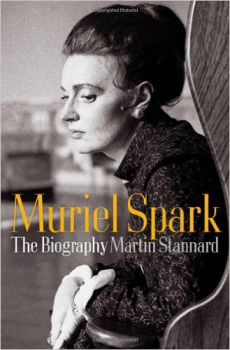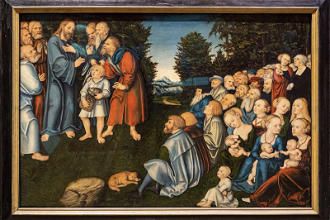Muriel Spark - The Biography by Martin Stannard

Muriel Spark - The Biography by Martin Stannard, (London: Weidenfeld and Nicolson, 2009).
At Eastertime, ten years ago (2006), Muriel Spark died in a hospital in Florence. It was Maundy Thursday, she was 88 years old. Her final years had involved a botched operation, and a great amount of physical pain. Yet she kept on writing novels up to the end, The Finishing School, her last, being published in 2004. Its title recalls her most famous work, The Prime of Miss Jean Brodie, but there is no other reason to draw this comparison. Her 22 novels explore humanity's troubled and envious relationships across many circumstances, from the grotesque account of a care home for the dying, in Memento Mori, to the naïve and sadistic inhabitants of Château Klopstock, in Not to Disturb, in which murder is obscurely linked to financial corruption.
Martin Stannard was asked to be Muriel Spark's biographer by the novelist herself, after he had published his biography of Evelyn Waugh. He has done her proud, seeking out the authentic person behind the celebrity, in situations where distortions of her life and motives were far too common. He observes that many of her stories involve an "epistemological crisis," where some "pre-laid plot" begins to be shaky and is then blown apart, making a new initiative unavoidable. Her life was one of considerable mobility, beginning with her early, disastrous marriage to a violent husband, which trapped her in the racist settings of white Rhodesia. She became, in Stannard's words, "the gentle and affectionate supporter of those who did not threaten."
She had been 19 in 1937 when she went by ship to Africa, soon to be horrified by the cruelty of the white settlers. Several fine short stories which she wrote in the 1950s and 1960s were constructed around her experiences there. One of these, 'The Seraph and the Zambesi' (1951) indicates a spiritual experience which put her personal sadness into perspective. Seeing the Zambesi river, as it thundered over the Victoria Falls, seemed to her a kind of mystical experience, 'the seraphic river' bringing her an awareness of strange energies. Stannard calls the story one of the first works of 'magic realism'. Its plot is both simple and fantastic, involving a Nativity Masque.
She managed to return to Britain during the War, and ended her marriage. She also began to think about Christian faith, Catholicism in particular. In 1949 she received communion as an Anglo-Catholic, although she was still essentially an agnostic. When she edited poems by Emily Bronte, she described her as a 'poet of Christianity,' yet also as a heretic and 'a mystic'. A new circle of friends who were Catholics, such as Frank Sheed, or sympathetic with Catholicism, helped her to talk freely about "our need for roots in God." An Ealing Benedictine from Malta, Fr. Agius, gave her formal instruction, and she was received into the Roman Catholic Church in 1954.
She was enthusiastic about Vatican II, and felt that Christianity, including Catholicism, was moving into an age of the Spirit. She could be critical of the kind of clergy who prefer dumbing down to tackling people's doubts and honest disbelief. Joining the Catholic Church involved complications in her closer relationships, to the extent that she had to get away from that entanglement of awkward emotions. She found an opportunity for peaceful reflection in a cottage near Aylesford, in Kent, with guidance from one or two Carmelites nearby. There she began work on her first novel, The Comforters, which was published in 1955, a story about conversion. Fr. O'Malley, keen on Jung's Answer to Job, expected this mix of theology and literary reflection to be helpful to her, but she found it too whimsical. She wrote an article about this, beginning a lifelong inquiry into how unreliably we see God as benevolent, while aware of the ironies of human suffering.
Muriel Spark was born in Edinburgh, but spent a significant amount of time with her aunt Adelaide, in Watford, a feminist. This relationship shaped a poem she wrote about Mary Magdalene, an account of Mary as a peacemaker. When asked by the Jesuit Philip Caraman to contribute to his series Saints and Ourselves, she found Augustine's mother, St. Monica, to be a sympathetic figure. She saw Monica as a "wise, oracular figure [who had] advanced ahead of herself into eternity." A resolute and tough figure, not to be copied but contemplated, she said. The resilience of women such as these blended in well with the plight of Job, who was a figure giving an outline to several of her later works of fiction. He represented the importance of resisting complacent, self-satisfied, conventional and hypocritical attitudes of every kind. Muriel read the book of Job regularly. This focus was still operative in 1983, when she went to a museum in which a painting by Georges de la Tour was on view: Job visité par sa femme. This galvanised her ideas once more, and enabled her to write The Only Problem? The central figure of Harvey Gotham is a sceptic but also has 'abounding faith'. When Gotham discovers he is being observed by policemen, these represent the shallow, interrogating 'comforters' of the biblical book. His visit to the same museum, in the story, and pondering on what is being communicated in the work of art which he sees there, places a telling role in the story.
It is probably not insignificant that Gregory the Great wrote a commentary, the Moralia on Job, and that Ronald Knox, who died in 1957, had translated the whole Bible into literary English. The figure of integrity in her 1960 novel, The Bachelors, was also called Ronald. He is something of an enigma, as was Muriel Spark. She emphasised her own habit of going over conversations which she had overheard, looking to capture the really appropriate detail. Those without integrity in The Bachelors are all attracted in some degree to the wispy unreal world of mediums, spiritualism and séances. It is a novel which I have enjoyed for its calm presentation of the buried character of sincerity in a Christian believer. Stannard's book is well worth reading alongside many of her novels, since it gives thorough overviews of the tensions in the novelist's life, at the period of writing each of her successful works. Free will and destiny are recurring issues from philosophical theology which contribute to the various ambiguities with which her characters wrestle.
Her religious experiences, and convictions related to these, play a part in how she portrays characters and their decision-making. She saw that cravings and possessiveness are best overcome and avoided. To experience wants is fine, but to sink into neediness is always problematic. The finest people are those who are capable of letting go. This factor is so important that we can generally gauge whether a character is heading towards greater integrity by their showing a lack of acquisitive traits, as distinct from other, less impressive characters, who cling to what might prove to bring them some material advantages. This division into two paths is not necessarily measured in terms of religious affiliations of a character (although this does often contribute some of their powers of discernment). It is a value in itself, without being overtly acknowledged in a given story as a process of conversion undertaken or prevented.
If we read her novels because we are curious about her conversion, we might be disappointed at the lack of detailed Church events and gatherings. But if we direct our thoughts to the transformative potential of serving God, as enhancing or deepening character, we can learn a lot about this steady, yet also actively considerate inner life. Martin Stannard's biography provides us with valuable additional insights into how Ms. Spark's friendships and relationships were like a testing ground for her process of letting go of dead emotions and harsh memories.


















